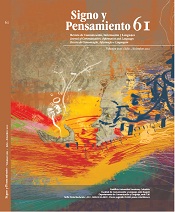Abstract
The article presents the results of a research project which sought to investigate reading and writing practices in Colombian universities. The methodological approach was built jointly by researchers from different universities based on a proposal by Jesus Ibañez. Through discussion groups, conceptions of these practices by students and lecturers from one university, as well as their concerns about the multidimensional problems identified, were gathered. The article argues the need to consider these views concerning any kind of intervention by universities, institutions or the State with regard to reading and writing in the classroom.
Calsamiglia, H., & Tusón, A. (2004). Las cosas del decir. Manual de análisis del discurso. Barcelona: Ariel Lingüística.
Canales, M., & Peinado, A. (2003). Grupos de discusión. En J. D. Herrera, Metodología de la investigación (págs. 287-316). Bogotá: Cinde.
Cartolari, M., & Carlino, P. (2011). Leer y tomar apuntes para aprender en la formación docente: un estudio exploratorio. Revista Internacional en Investigación en Educación, 4(7), 67-86.
Carvajal, G. (2008). Lecturas y escrituras juveniles. Entre el placer, el conformismo y la desobediencia. Cali: Programa Editorial Universidad del Valle.
Castañeda, L. S., Henao, J. I., & Londoño, D. A. (2011). Niveles de literacidad en tres universidades del Valle de Aburrá. La lectura y escritura como criterios de calidad de la educación superior. Barranquilla: VI Congreso Internacional Cátedra Unesco.
Cazden, C. (1991). El discurso en el aula. Barcelona: Paidós.
Chois, P., & Santacruz, M. (2010). Prácticas de lectura y escritura académicas en el programa académico de Fonoaudiología de la Universidad del Cauca. Revista Facultad Ciencias de la Salud, 12(3), 50-62.
Gómez, O. (2011). Actos pedagógicos y estrategias mediadoras de rendimiento académico para fortalecer competencias de lectura y escritura de los estudiantes del programa de Contabilidad Financiera de las Unidades Tecnológicas de Santander. La lectura y la escritura como criterios de calidad en la educación. Barranquilla: VI Congreso Internacional Cátedra Unesco.
Ibáñez, J. (1985). Del algoritmo al sujeto. Madrid: Siglo XXI.
Ibáñez, J. (2003). Más allá de la sociología. El grupo de discusión: técnica y crítica. 5.ª edición. Madrid: Siglo XXI.
Krueger, R. (1991). El grupo de discusión. Guía práctica para la investigación aplicada. Madrid: Ediciones Pirámide, S.A.
Llopis, R. (2004). El grupo de discusión. Manual de aplicación para la investigación social, comercial y comunicativa. Madrid: Editorial ESIC.
Moreno, J. A., Ayala, R., Vázquez, C. A., & Díaz, J. C. (2011). Evaluación de niveles de lectura en el contexto de la educación superior. La lectura y escritura como criterios de calidad en la educación. Barranquilla: VI Congreso Internacional Cátedra Unesco.
Ochoa, S., & Aragón, L. (2004). La alfabetización en la universidad y su relación con las estrategias de aprendizaje y enseñanza. Pensamiento Psicológico 2(2), 9-39.
Van Dijk, T. (2004). Discurso y Dominación. Grandes Conferencias en la Facultad de Ciencias Humanas, 4, 5-28.
Vasilachis, I. (2007). Estrategias de investigación cualitativa. Barcelona: Gedisa.
This journal is registered under a Creative Commons Attribution 4.0 International Public License. Thus, this work may be reproduced, distributed, and publicly shared in digital format, as long as the names of the authors and Pontificia Universidad Javeriana are acknowledged. Others are allowed to quote, adapt, transform, auto-archive, republish, and create based on this material, for any purpose (even commercial ones), provided the authorship is duly acknowledged, a link to the original work is provided, and it is specified if changes have been made. Pontificia Universidad Javeriana does not hold the rights of published works and the authors are solely responsible for the contents of their works; they keep the moral, intellectual, privacy, and publicity rights.
Approving the intervention of the work (review, copy-editing, translation, layout) and the following outreach, are granted through an use license and not through an assignment of rights. This means the journal and Pontificia Universidad Javeriana cannot be held responsible for any ethical malpractice by the authors. As a consequence of the protection granted by the use license, the journal is not required to publish recantations or modify information already published, unless the errata stems from the editorial management process. Publishing contents in this journal does not generate royalties for contributors.


